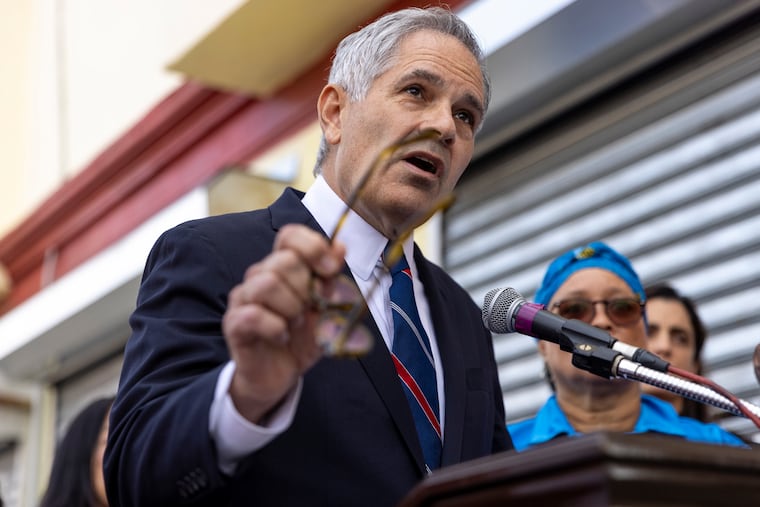Hey, Larry Krasner: You are not above the law
By digging in his heels and refusing to comply with the legislature’s legitimate exercise of its investigatory power, Krasner is now alienating even members of his own party.

Larry Krasner has always done things his own way. When he was a private defense attorney, that was fine (within limits). But as an elected official, and the chief law enforcement officer in the city of Philadelphia, Krasner is bound to follow and respect the law.
As recent events have shown, he refuses time and again to do that. When he was among the vanguard of progressive prosecutors that swept the nation, everyone knew he would make some drastic changes. But it is hard to believe that even Krasner’s more fervent supporters would have predicted his relentless disregard for the rule of law.
The problems that attracted the state legislature’s attention are those that most Philadelphians have noticed, too: the rising violent crime in the city, combined with the DA’s decision to prosecute fewer illegal gun charges. Krasner’s office has received strong criticism from the Pennsylvania Supreme Court and U.S. District Court Judge Mitchell Goldberg about how it has handled recent cases, with Judge Goldberg requiring Krasner to apologize personally to the family of a murder victim.
How did Krasner and company respond? Spokesperson Jane Roh told the press that they “strongly disagree with Judge Goldberg’s ruling and are currently evaluating our options.” The only “options” when a judge tells you to apologize are to do it, and quickly. But for a rogue DA who does not enforce the law when it conflicts with his own worldview, ignoring a judge’s order is just more of the same.
Now, Krasner is ignoring the state legislature. A committee was convened to investigate Krasner in Harrisburg, and when they issued a subpoena, he refused to comply, calling it “illegal,” “antidemocratic,” and “wholly illegitimate.”
The idea that the DA would refuse to cooperate with an investigation is odd already — they are usually the ones issuing subpoenas, not hiding from them. But calling the whole impeachment process illegal and illegitimate, despite it being explicitly authorized by the state constitution, was a step too far for most members of the state House of Representatives. Krasner is right that he has his job because Philadelphia voters reelected him (with a big majority). He may not believe he deserves impeachment — impeached officers rarely do — but he must acknowledge that it is actually a legal process that exists.
Krasner decried the process as partisan from the beginning, and it is true that most — but not all — of those who voted to investigate him were Republicans (110 Republicans and four Democrats voted for it, including three from Philadelphia; 85 Democrats and one Republican voted against). But by digging in his heels and refusing to comply with the legislature’s legitimate exercise of its investigatory power, Krasner is now alienating even members of his own party.
All five members of the committee formed to investigate Krasner’s actions (or inactions) — three Republicans and two Democrats — voted to hold Krasner in contempt for ignoring the subpoena. When the motion reached the floor of the House, the result was also a bipartisan condemnation of the district attorney: The chamber voted 162 to 38 to hold him in contempt, which included the votes of ten Democratic members from Philadelphia. That’s 81% of the House, including dozens of Democrats who were initially on his side and voted against opening an impeachment investigation.
Other progressive prosecutors are meeting the same fate around the country, as a bipartisan consensus is emerging that stopping crime is the most important part of the job. Chesa Boudin was ousted by San Franciscans in a recall election. George Gascon narrowly avoided a vote on his recall in Los Angeles.
We don’t have recalls in Pennsylvania. What we do have is impeachment, and the more intransigent Krasner becomes, the more his erstwhile allies could desert him.
Following the law isn’t an option when your entire job is law enforcement. Elected officials can and should work to change the law when they think it is unjust or wrongheaded, but refusing to follow the law isn’t civil disobedience when you’re a government official; it’s dereliction of duty.
Political tribalism often convinces us to back people on our own side, even when we see their many flaws, because the alternative — someone from the other “tribe” winning — is worse. But sometimes, as about half the Democrats in Harrisburg just demonstrated, enough is enough. Just as Doug Mastriano’s excesses have led some Republicans to jump ship, Krasner’s outright refusal to obey the law may start to convince Democrats that the time has come to let Krasner go his own way — out of office.
Kyle Sammin is editor-at-large at Broad + Liberty.